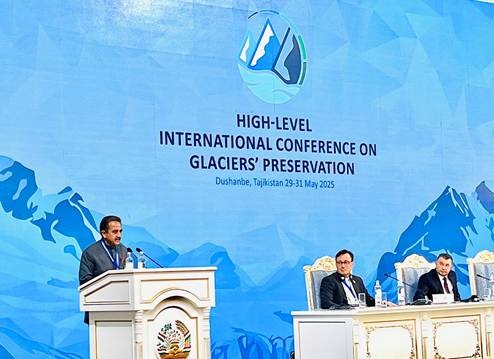NewzVille Desk
Union Minister of State for Environment, Forest and Climate Change (EFCC), Kirti Vardhan Singh addressed the Plenary Session of the High-Level International Conference on Glaciers’ Preservation, held from 29 – 31 May 2025, in Dushanbe, Tajikistan. The event brought together international experts, policy makers, and Ministers to deliberate on urgent actions needed to safeguard glaciers, which serve as critical freshwater reservoirs and indicators of climate change.
Singh emphasized that the retreat of glaciers represents not only a warning but an immediate reality with far-reaching implications for water security, biodiversity, and the livelihoods of billions of people.
Highlighting the global and regional consequences of glacial retreat, the Minister underscored that the phenomenon is accelerating, with disproportionate impacts on mountain regions such as the Himalayas.
He reiterated India’s deep-rooted concern, as a country intrinsically connected to the Himalayan ecosystem, and outlined a series of ongoing initiatives aimed at glacial monitoring and climate adaptation.
Singh highlighted that India is undertaking strategic actions under the National Mission for Sustaining the Himalayan Ecosystem (NMSHE) – a key component of India’s National Action Plan on Climate Change (NAPCC) – as well as the establishment of a Centre for Cryosphere and Climate Change Studies, designed to advance research and monitoring of glaciers and glacial lakes in the Indian Himalayan Region.
The Minister informed that India has strengthened disaster preparedness in the Himalayan region through improved early warning systems and Glacial Lake Outburst Flood (GLOF) risk mapping, coordinated by the National Disaster Management Authority (NDMA). Regional cooperation was underscored as vital for strengthening resilience, improving data-sharing frameworks, and fostering coordinated responses to the challenges facing mountain ecosystems.
Addressing the global context, the Minister reaffirmed India’s commitment to equity and the principle of Common but Differentiated Responsibilities and Respective Capabilities (CBDR–RC) in international climate action.






